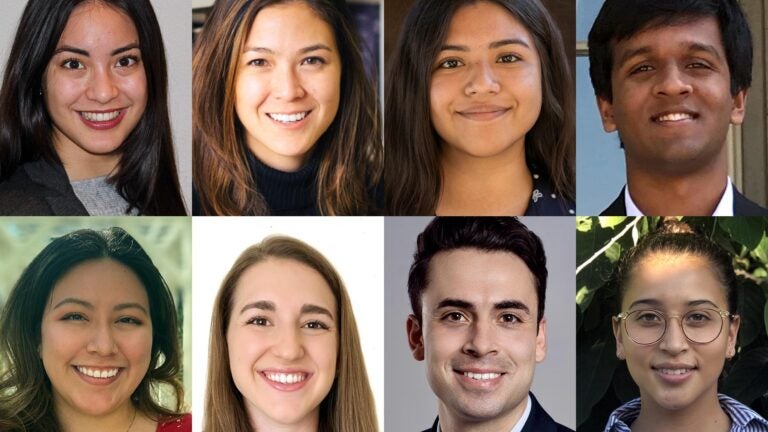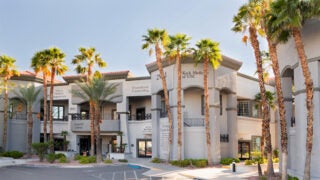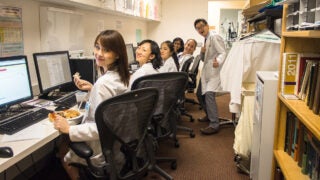
Student COVID workers: (top row, from left) Rachel Gutkin, Acacia Hori, Dianna Jimenez and Nikhilesh Kumar; (bottom row, from left) Samantha Lozano, Blair Stiers, Omar Toubat and Sonia Treminio. (Photos/Courtesy of the students)
???? Meet the students who fight COVID-19 through research
They span from passionate future physicians to first-gen students who translated for Spanish-speaking patients. Hear from some of the Trojans who jumped into the race against COVID-19.
As vaccine rollouts continue across the country, it’s easy to forget that the progress made in fighting the COVID-19 pandemic would never have been possible without front-line medical professionals, scientists, researchers — and students.
From the first-generation Trojan who used to translate for her parents during doctor appointments to the Spanish major who saw firsthand the need for bilingualism in medicine, a special group of USC students has been at the forefront of COVID-19 antibody research.
Meet some of those students who — under the direction of Neeraj Sood, director of the COVID Initiative at the USC Schaeffer Center for Health Policy & Economics — have been part of the teams working with the city of Los Angeles, the L.A. Fire Department and surrounding communities to better understand and battle COVID-19.
Rachel Gutkin
Junior
Major: Spanish (health care studies minor, pre-med track)
Hometown: Irvine, Calif.
[iframe width=”100%” height=”166″ scrolling=”no” frameborder=”no” allow=”autoplay” src=”https://w.soundcloud.com/player/?url=https%3A//api.soundcloud.com/tracks/1009182619&color=%23ff5500&auto_play=false&hide_related=false&show_comments=true&show_user=true&show_reposts=false&show_teaser=true”]
[/iframe]
As a Spanish major, Rachel Gutkin saw firsthand the importance of bilingualism in medicine, especially in L.A. Starting as a volunteer, Gutkin said what initially attracted her to the study was not only the actual COVID-19 research but also the opportunity to use her Spanish fluency to assist underserved communities.
One of the more difficult parts of her work was navigating the variations of Spanish that people spoke. Gutkin learned Spanish in school, which can be different from how many people speak it day to day. She quickly had to adjust to speaking more conversationally while also trying to convey medical terminology and dispel any COVID-19 misinformation.
“I can imagine how things get so lost in translation from English to Spanish, and then someone’s telling them something else,” she said. “The amount of people that it goes through by the time it reaches that person — that piece of information is so twisted and convoluted that it’s not at all like the original message was.”
Acacia Hori
MD/PhD student
Hometown: Northridge, Calif.
[iframe width=”100%” height=”166″ scrolling=”no” frameborder=”no” allow=”autoplay” src=”https://w.soundcloud.com/player/?url=https%3A//api.soundcloud.com/tracks/1009182670&color=%23ff5500&auto_play=false&hide_related=false&show_comments=true&show_user=true&show_reposts=false&show_teaser=true”]
[/iframe]
As an MD/PhD student, Acacia Hori’s role was slightly different than the roles of the undergraduates in the project. Having volunteered after her own doctoral lab was closed to in-person research, Hori jumped at the opportunity to be a site lead for one of the early drive-thru testing sites measuring seroprevalence — the number of people who have tested positive.
With a topic that has so much interest and such high stakes, Hori said she had to make sure everything was airtight to obtain the highest quality data possible. Most importantly, she wanted to provide data that people can trust and draw conclusions from and that can’t be taken out of context or misconstrued to fit an agenda.
“The bread and butter of things that I take satisfaction from is communicating science,” she said. “I’m really using my education that I am so grateful to have to tell someone exactly what the test entails. Seeing that moment of understanding on people’s faces gives me so much satisfaction.”
Dianna Jimenez
Senior
Major: Health Promotion and Disease Prevention Studies
Hometown: Paramount, Calif.
[iframe width=”100%” height=”166″ scrolling=”no” frameborder=”no” allow=”autoplay” src=”https://w.soundcloud.com/player/?url=https%3A//api.soundcloud.com/tracks/1009182715&color=%23ff5500&auto_play=false&hide_related=false&show_comments=true&show_user=true&show_reposts=false&show_teaser=true”]
[/iframe]
A first-generation college student, Dianna Jimenez didn’t have prior research experience. So as a health promotion and disease prevention major, she jumped at the opportunity to volunteer. As a bilingual student in the health field, Jimenez was able to work as a translator and site coordinator.
Jimenez grew up just down the road from USC’s University Park Campus and said she considered it a privilege to work on these studies because the communities being surveyed were a mirror image of where she grew up. As a child, Jimenez translated for her parents at doctor appointments and explained complex medical terms and procedures. She credits those early experiences with preparing her for this current role and pushing her toward a career in the medical field.
“Channeling what I’ve been through, and then applying it to people that look like me and are from the same community as me, empowers me and gives me more motivation to help them as much as I would help my parents,” she said. “I feel like I’m just in the doctor’s room with my parents again, except I have more knowledge now.”
Nikhilesh Kumar
Junior
Major: Neuroscience (comparative literature minor)
Hometown: Sacramento, Calif.
[iframe width=”100%” height=”166″ scrolling=”no” frameborder=”no” allow=”autoplay” src=”https://w.soundcloud.com/player/?url=https%3A//api.soundcloud.com/tracks/1009182646&color=%23ff5500&auto_play=false&hide_related=false&show_comments=true&show_user=true&show_reposts=false&show_teaser=true”]
[/iframe]
As president of the student organization Southern California Health Care Outreach, a health care advocacy organization that works to expand health care coverage in L.A., Nikhilesh Kumar said he was inspired to volunteer after hearing Sood give a Price Talk in April.
Kumar said volunteering provided him the hands-on research experience he had hoped for and also allowed him to interact with students from various fields. Having primarily worked on formatting and creating surveys, he was happy to contribute to research that has both local and national impact.
“It’s so cool to see something that I worked on be important and relevant in policymaking because I’m interested in politics and policy and how policies affect people,” he said. “Something that I worked on would be directly influencing policies soon, so that’s really cool to see.”
Samantha Lozano
Senior
Major: Human Biology (health care studies, forensics and criminality minor)
Hometown: San Gabriel, Calif.
[iframe width=”100%” height=”166″ scrolling=”no” frameborder=”no” allow=”autoplay” src=”https://w.soundcloud.com/player/?url=https%3A//api.soundcloud.com/tracks/1011529813&color=%23ff5500&auto_play=false&hide_related=false&show_comments=true&show_user=true&show_reposts=false&show_teaser=true”]
[/iframe]
Samantha Lozano admits that as excited as she was to volunteer for the project, her family did not share her enthusiasm.
“They were like, ‘Really? You want to go out and test a bunch of families for COVID when we’re trying to stay safe right now?’” Lozano said. “But this is what I want to do in the future, so I thought it was a risk worth taking.”
Also bilingual, Lozano said she’d eventually like to work in an emergency room, specifically in pediatrics. She already has volunteer experience with Children’s Hospital Los Angeles and is the president of Mobile Clinic USC, a student group that works with Keck School of Medicine of USC and the John Wesley Community Health Institute to provide high-quality primary care to residents at various homeless shelters throughout L.A.
Blair Stiers
MD student
Hometown: Pleasanton, Calif.
[iframe width=”100%” height=”166″ scrolling=”no” frameborder=”no” allow=”autoplay” src=”https://w.soundcloud.com/player/?url=https%3A//api.soundcloud.com/tracks/1009182604&color=%23ff5500&auto_play=false&hide_related=false&show_comments=true&show_user=true&show_reposts=false&show_teaser=true”]
[/iframe]
Another medical student, Blair Stiers said health care accessibility was a huge focal point for her: The early drive-thru antibody studies required a car as well as a smartphone.
The Bay Area native got involved in medicine to work on health disparities, and these studies showed how wide they are. Part of Sood’s studies was looking at disparities, particularly in Latinx communities, where death and infection rates were three or four times those of white communities. So after everything that 2020 brought, Stiers just hopes that people start to care a little bit more.
“I think we knew that all these disparities existed prior to COVID, but COVID has really highlighted to the general public disparities in access to care,” Stiers said. “Now we’re becoming more comfortable calling out racism in medicine, and patients being treated differently based on our implicit biases that we all bring to the table, whether we want to believe it or not.”
Omar Toubat
MD student (Development, Stem Cells and Regenerative Medicine)/PhD student in Philosophy
Hometown: Walnut, Calif.
[iframe width=”100%” height=”166″ scrolling=”no” frameborder=”no” allow=”autoplay” src=”https://w.soundcloud.com/player/?url=https%3A//api.soundcloud.com/tracks/1009182643&color=%23ff5500&auto_play=false&hide_related=false&show_comments=true&show_user=true&show_reposts=false&show_teaser=true”]
[/iframe]
As an L.A. native who earned his bachelor’s degree at USC, Omar Toubat saw this as an opportunity to be part of significant research on both a national and local level. Initially serving as a site lead on the antibody test, Toubat said the actual research made up only a portion of his duties.
Early in the study, he and his team of researchers received a lot of questions about COVID-19 from the community, and he quickly learned the value of effective communication.
“Providing clarity, or an understanding of what is factual or what is evidence-based, was a big part of what we did,” he said. “I felt like, in addition to conducting the study, there was a lot of conversation with study participants and even among volunteers to make sure that we were all on the same page. It was pretty humbling to be involved in because the residents of Los Angeles County wanted to participate and help further our understanding of COVID.”
Sonia Treminio
Senior
Major: Health and the Human Sciences (economics minor)
Hometown: Lynwood, Calif.
[iframe width=”100%” height=”166″ scrolling=”no” frameborder=”no” allow=”autoplay” src=”https://w.soundcloud.com/player/?url=https%3A//api.soundcloud.com/tracks/1009182682&color=%23ff5500&auto_play=false&hide_related=false&show_comments=true&show_user=true&show_reposts=false&show_teaser=true”]
[/iframe]
Another first-generation college student, Sonia Treminio started with Jimenez as a translator in multiple studies and said the experience showed her the true impact COVID-19 had on Latino communities across L.A.
One of the most difficult elements was often correcting misinformation. Treminio said she noticed a language and education barrier caused a lot of distrust within the community, which made her think about how different their experience would’ve been had she or other researchers not spoken Spanish. Ultimately, the experience allowed her to connect with and provide comfort to people in her own community.
“The San Fernando Valley is predominantly Latino,” she said, “so getting to know my community more, speaking to them in Spanish and being able to help them has been such a rewarding experience.”



